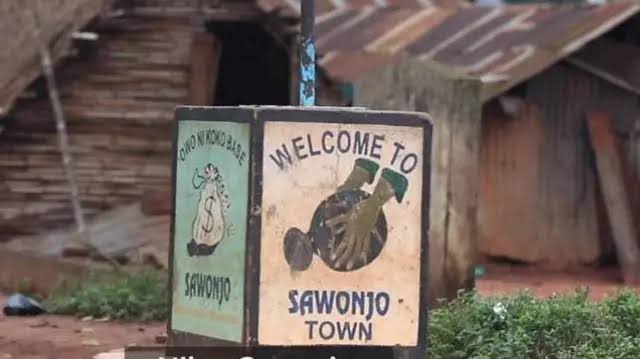By: Lauretta Fagbohun, Abeokuta.
In the heart of Yewa North Local Government Area of Ogun State lies Sawonjo an ancient agrarian community steeped in history, tradition, and mystery. Bordered by Igbogila and Igan-Okoto, and tucked away between stretches of farmland and dusty roads, Sawonjo is unlike any other Nigerian town. Here, theft is not merely frowned upon it is practically non-existent. Residents build homes without keys or padlocks. Motorcycles, generators, and other valuables are left outside without fear of being stolen. In Sawonjo, security is not enforced by police patrols or CCTV cameras, but by the enduring power of a centuries-old deity called Aganju.
The trip to Sawonjo begins from Ogun’s state capital, Abeokuta, down to Imasayi. From there, a smooth drive along the newly constructed Imasayi–Iboro–Ayetoro road makes for a pleasant journey. But once the car turns from Igan-Okoto towards Sawonjo, the smooth asphalt gives way to a rough and bumpy road a stark reminder that despite its rich history, Sawonjo remains largely untouched by modern infrastructure.
When TVC News senior staff Kazeem Olowe arrived in the community for the Sunday Special feature, he found a place where time seemed to move differently. The air was quiet, punctuated only by the sounds of farming tools, bleating goats, and conversations in the native Yewa land.
Sawonjo’s roots stretch back more than 400 years. Oral tradition says it was founded by a skilled hunter named Aradokun and his wife, Ikiso, who migrated from the Oyo Empire. The couple settled on this fertile land, attracted by its abundant wildlife and favorable climate. Over the centuries, Sawonjo grew into a close-knit farming community where yam, cassava, maize, and other crops flourished.
But more than its agricultural heritage, Sawonjo is known for its impenetrable code of honesty. Residents say that in living memory, no one can recall a case of burglary, armed robbery, or petty theft within the community
The secret behind Sawonjo’s crime-free status lies in the town’s unwavering belief in Aganju, an invisible but feared spiritual force. Unlike other Yoruba deities with visible shrines, Aganju has no fixed physical location. It is not an idol carved in wood or molded from clay, rather, it is described as a roaming spirit that can be summoned through specific incantations.
The Olu of Sawonjo, Oba Michael Oderinde, speaking through his second-in-command, the Adele Oba, Mulero Muibi, explained that Aganju’s role as the community’s moral enforcer is centuries old. “Here in Sawonjo, we do not tolerate theft in any form,” he said. “If anyone steals and refuses to return the item, Aganju will be consulted. Once called, the deity will identify the culprit, and the punishment is certain death whether the thief is in Sawonjo, another state, or even overseas.”
Mulero’s own home has stood for nearly three decades without a single key to its doors. “If you see me jamming the door, it’s only to keep the goats out,” he said with a smile.
To verify these claims, Pa Shuaib Mulero, an elder in the community. His house, too, stood unlocked. “It has been this way for years,” he said. “We only close doors to stop goats from wandering inside. We don’t lock them.”
This culture of openness extends throughout Sawonjo. It is not unusual to see motorcycles left unattended in the open or generators humming outside homes overnight. The people say they have no reason to worry because Aganju watches over them.
Even the monarch’s wife, Olubunmi Oderinde, echoed this confidence: “Sawonjo is a peaceful town. We don’t need police patrols. Whoever misbehaves or steals will have to face Aganju. Even plucking fruits from a tree without permission could invite its wrath.”
One of Aganju’s custodians, Jimoh Olahanmi, known locally as Osolo, revealed more about the deity’s feared powers. “No one knows where Aganju’s shrine is because it has none,” he said. “Once consulted, it carries out justice unfailingly. There is no antidote. Even if the thief flees to another planet, Aganju will strike, and death will come within seven days.”
The Adele Oba confirmed that the spirit’s reach is not bound by geography. “The spirit of Aganju is everywhere in Sawonjo. It was one of the forces our forefathers used to protect the land against enemies. It’s intangible but powerful. Once invoked, it obeys the instructions given by its custodians and delivers judgment without hesitation.”
Sawonjo’s uniqueness does not end with Aganju. The community is also home to the Ikiso River, revered for its healing properties and its role in ensuring rainfall during droughts. Residents believe the river’s blessings, alongside Aganju’s protection, have made their land fertile and prosperous.
During planting seasons, elders may perform rituals at the river to invoke rain. At other times, people visit the waters for healing baths, convinced of its medicinal properties passed down through generations.
In a country where burglary, theft, and insecurity dominate the headlines, Sawonjo stands out as a rare anomaly a place where doors remain open, and trust is a way of life. For its people, this is not a naïve gamble but a tried-and-tested system of justice.
To outsiders, Sawonjo might seem like a relic from a bygone era. But to its 21st-century residents, it is proof that tradition, when respected, can be stronger than any lock or police patrol. In Sawonjo, the saying holds true: the fear of Aganju is the beginning of security.













